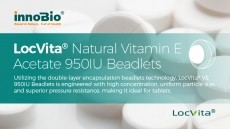CoQ10 bioavailability boost from soft gels: Study
Researchers from Canada’s KGK Synergize compared CoQ10 formulations from hard and soft gel capsules, and found the reduced form from the latter resulted in a 3.3-fold higher blood level of CoQ10 than the former.
The findings of the study, supported financially by Soft Gel Technologies, are published in the first issue of the newly launched Journal of Functional Foods.
“The reduced [CoQ10 formulation] preparation was found to be far superior to the commercial formulation for bioavailability and warrants consideration not only as a dietary supplement, but also for clinical application,” wrote lead author Malkanthi Evans.
There is an ever-growing body of scientific data that shows substantial health benefits of CoQ10 supplementation for people suffering from angina, heart attack and hypertension. Clinical trials have also reported benefits for cardiomyopathy and congestive heart failure.
However, the formulation of the CoQ10 is known to play a key role in its bioavailability. Since the coenzyme is lipophilic (fat-loving) its absorption is enhanced in the presence of lipids. Therefore, when taken as a supplement apart from meals, the absorption of some formulations is lower.
Trials with CoQ10 supplements in powder and oil-suspension forms are reported to result in small or negligible responses in plasma CoQ10 concentrations.
Study details
The small study, which included only 10 subjects (average age 67, average BMI 26.6 kg/m2, eight women), used a single-centre, double-blind, randomized two-arm crossover design.
Evans and co-workers assigned the volunteers to receive either a single 100 mg of the commercial CoQ10 formulation in a hard capsule (Nutri-Chem, Canada), or the reduced CoQ10 in a soft gel capsule (formulated by Soft Gel Technologies).
Blood concentrations of CoQ10 showed that the higher levels were received after intake of the reduced co-enzyme at five, six, eight, 12, 24, 48 and 72 hours.
Indeed, a 430 per cent increase in levels was recorded in the subjects receiving the reduced form, compared to subjects receiving the standard commercial form, said the researchers.
“In the current study, both formulations studied were presented as capsules; however, [the reduced form] was formulated using reduced CoQ10 with stabilizing ingredients in a soft gel capsule compared to the typical commercial formulations,” wrote the researchers. “It can be inferred that the product maintained integrity leading to an increased rate of absorption, resulting in greater bioavailability.”
Chemistry of CoQ10
CoQ10 has properties similar to vitamins, but since it is naturally synthesized in the body it is not classed as such. With chemical structure 2,3-dimethoxy-5-methyl-6-decaprenyl-1,4-benzoquinone, it is also known as ubiquinone because of its 'ubiquitous' distribution throughout the human body.
The coenzyme is concentrated in the mitochondria - the 'power plants' of the cell - and plays a vital role in the production of chemical energy by participating in the production of adenosince triphosphate (ATP), the body's co-called 'energy currency'.
A role beyond the mitochondria is also acknowledged, with CoQ10 acting as a potent antioxidant. The coenzyme plays an important role in preserving levels of vitamin E and vitamin C.
Source: Journal of Functional FoodsJanuary 2009, Volume 1, Issue 1, Pages 65-73"A randomized, double-blind trial on the bioavailability of two CoQ10 formulations"Authors: M. Evans, J. Baisley, S. Barss, N. Guthrie















